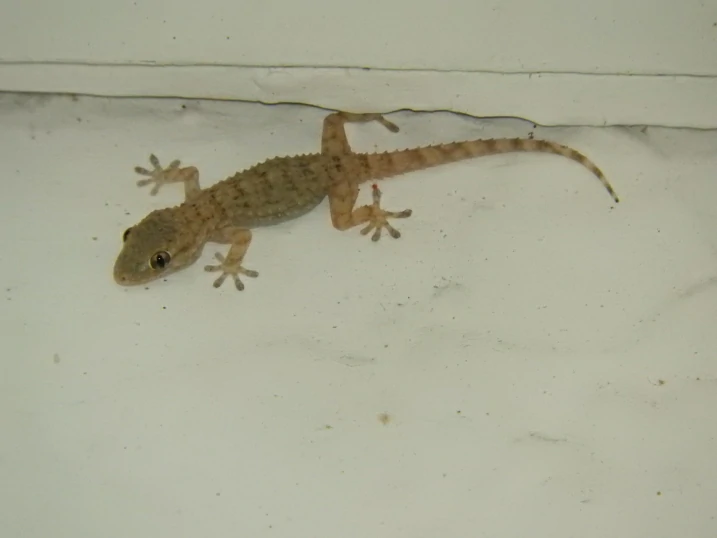You’re lying in bed one night, scrolling through your phone, when something small moves near the wall. You glance up, and there it is, a gecko, quietly creeping along the ceiling. Then you wonder, could that little thing actually climb onto my bed?
Yes, geckos can climb on beds, but they usually don’t mean to. They can easily climb up smooth walls, ceilings, and furniture, including bed frames or mosquito nets. Their climbing skills are amazing, but they’re not trying to get close to you. They just follow insects or explore new places, and sometimes, your bed happens to be in the way.
How Geckos Manage to Climb Almost Anything
If you’ve seen a gecko sticking to a smooth wall or hanging upside down from the ceiling, you’ve probably wondered how it does that. The secret is under its toes.
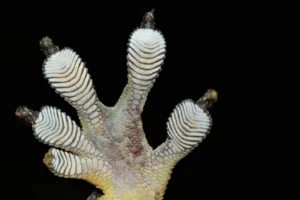
Each toe has millions of tiny hairs called setae. These split into even smaller tips called spatulae. They don’t use glue or suction, instead, they stick using something called van der Waals forces.
It sounds fancy, but it just means the tiny hairs grab onto the surface at a molecular level.
That’s why a gecko can climb your wall, walk across your headboard, or even stick to a curtain without falling. Its toes work like built-in climbing tools.
They can also turn this stickiness on and off right away. When a gecko lifts a toe, the grip breaks cleanly. This lets it move fast and never get stuck.
Why a Gecko Might End Up on Your Bed
Just because a gecko can climb on your bed doesn’t mean it wants to. Most of the time, it’s just looking for food or wandering around.
Here are a few common reasons why a gecko might wander onto a bed:
-
Following insects: Geckos love mosquitoes, flies, and small moths. If a bug lands near your bed, the gecko might follow.
-
Hiding place: Beds, especially ones near walls or windows, can offer shade or shelter.
-
Mistaken route: Sometimes a gecko is just crossing the room and your bed happens to be in the way.
-
Warmth: In cooler weather, they may wander toward warm spots, especially near lamps or body heat.
But don’t worry, geckos aren’t trying to crawl on you. They don’t see humans as food or danger. If you move suddenly, they’ll run off fast.
Are Geckos Dangerous if They Climb on Your Bed?
Not at all. Geckos are harmless. They don’t bite unless they’re grabbed, and even then, it just feels like a tiny pinch. They don’t have venom, and they don’t attack people.
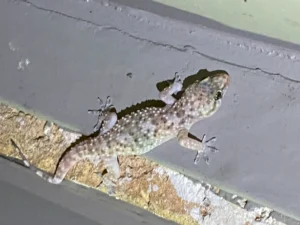
Actually, it’s good to have geckos around. They eat mosquitoes, moths, and cockroaches that would otherwise bother you at night.
You can think of them as natural pest control with sticky toes.
Some people even believe geckos bring good luck.
In parts of Asia and Africa, hearing a gecko chirp near your room is seen as a sign of good fortune, or at least fewer mosquitoes.
How to Tell If a Gecko Has Been on Your Bed
If you think a gecko climbed on your bed, you might notice small signs, but they’re usually hard to spot:
-
Tiny droppings: Small dark pellets with a white tip.
-
Little footprints: On smooth spots like headboards or windows, you might see faint tracks.
-
Shed skin: Geckos shed now and then, leaving tiny bits of skin behind.
Still, you’ll rarely find proof. Geckos move quietly and don’t stay long. Most are gone before you even notice.
What Geckos Usually Do at Night While You’re Sleeping
While you’re asleep, geckos are awake and hunting. They’re night animals, so that’s when they’re most active. Light from a lamp or window draws insects, and that draws geckos too.
A house gecko might move along the wall, scanning for movement.
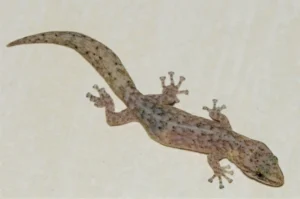
When it spots a mosquito, it darts forward, flicks its tongue, and eats. Then it waits again, watching for the next bug.
They rarely go down to the floor or onto furniture unless food is there. Since beds don’t have many bugs, geckos mostly stay up high.
So if you see one near your bed, it’s not after you, it’s after the mosquitoes that keep you awake.
Can Geckos Fall on You While You Sleep?
This is what most people worry about, what if it falls from the ceiling?
Technically, it could happen, but it’s very rare. Their toes are super strong. A single toe can hold more than their body weight.
They move carefully and almost never slip.
Still, geckos can drop their tails if they’re scared. So if one’s above your bed and something startles it, it might jump or fall.
Even then, they’re light and soft, so if one landed near you, you’d barely feel it.
Most of the time, they stay safely on walls and ceilings, far from your bed.
How to Keep Geckos Away from Your Bed (If You Prefer)
Even though they’re harmless, not everyone likes geckos in the bedroom. If that’s you, here are some simple ways to keep them out no harm done.
-
Reduce insects: They come for food, so cut off the food source. Use insect screens, clean up crumbs, and turn off extra lights.
-
Seal cracks and gaps: Close small openings in vents, windows, or walls where they might come in.
-
Move your bed slightly from the wall: That small space makes it harder for them to reach your bed.
-
Use mild natural repellents: Things like garlic, onion slices, or coffee grounds can make geckos stay away. They don’t like strong smells.
Remember, geckos don’t want to live on your bed. They’re just exploring. Once there are fewer bugs, they’ll move somewhere else.
What Happens If a Gecko Actually Gets on the Bed?
Let’s imagine it. You wake up and see a gecko sitting on your blanket. What should you do?
Stay calm. Move slowly. Quick movements will scare it, and it’ll run. Use a pillow or soft cloth to gently guide it off the bed.
It’ll usually head for a darker spot, like under a table or behind a curtain.
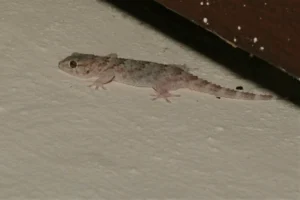
If you want to help it leave your room, open a window and turn off the lights. The dark outside will lead it out.
Don’t try to grab it, if it feels scared, it might drop its tail. That’s stressful for them.
It’s really just a little visitor passing through.
The Benefits of Having Geckos Around (Even Near Beds)
Even if you don’t love them, geckos are actually helpful. They eat mosquitoes, moths, and even small cockroaches.
One tiny gecko can eat dozens of insects a night.
They also don’t damage anything. They don’t chew wires or ruin furniture.
The worst they leave behind are a few tiny droppings, and those are easy to clean.
In a way, geckos are quiet little roommates that ask for nothing, just a few bugs to snack on.
Conclusion
So, do geckos climb on beds? Yes, they can, but they don’t mean to. They follow bugs, warmth, or light, not people.
Their sticky toes let them climb almost anything, but they prefer high walls and dark corners where they feel safe.
If one ends up near your bed, it’s just passing through. It might chase a mosquito or stop to rest before leaving again
. They don’t bite, don’t cause harm, and mostly stay out of sight.
A gecko near your bed isn’t something to worry about. It’s just a small piece of the wild world sharing your space, keeping balance, one quiet step at a time.
Hi, my name is Ezra Mushala, i have been interested animals all my life. I am the main author and editor here at snakeinformer.com.

